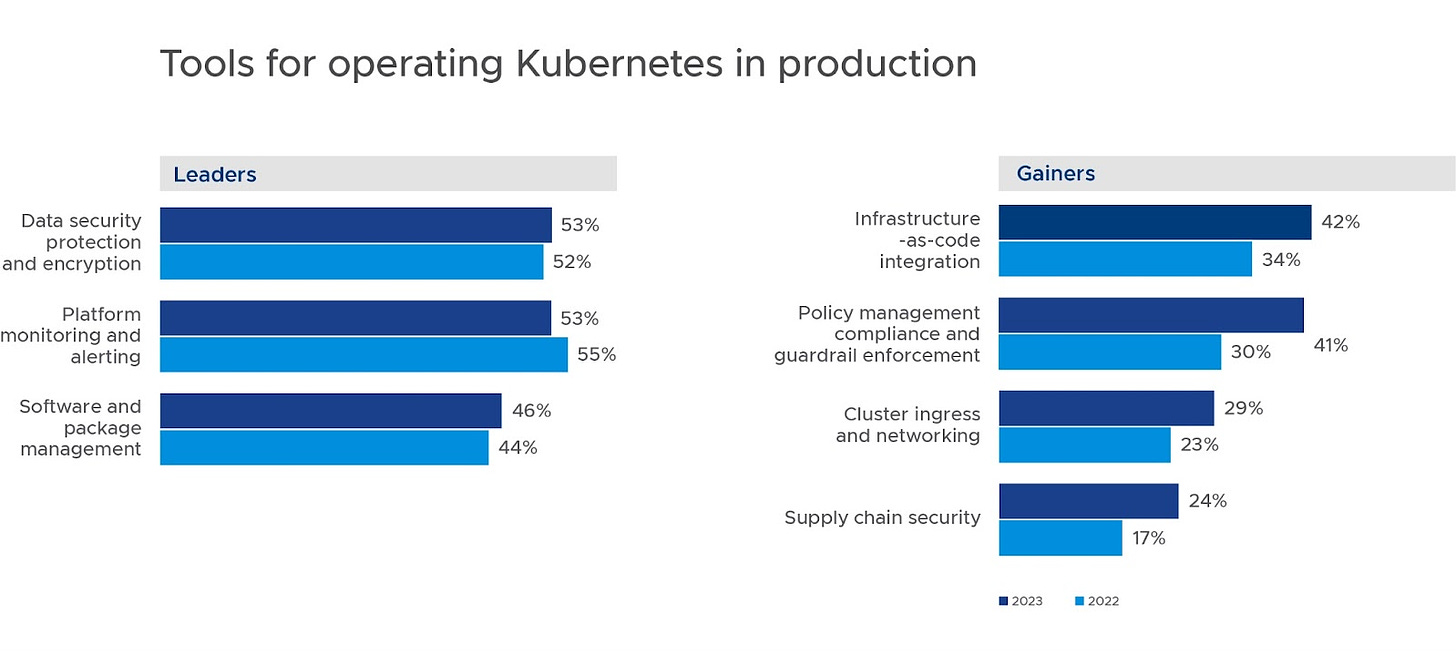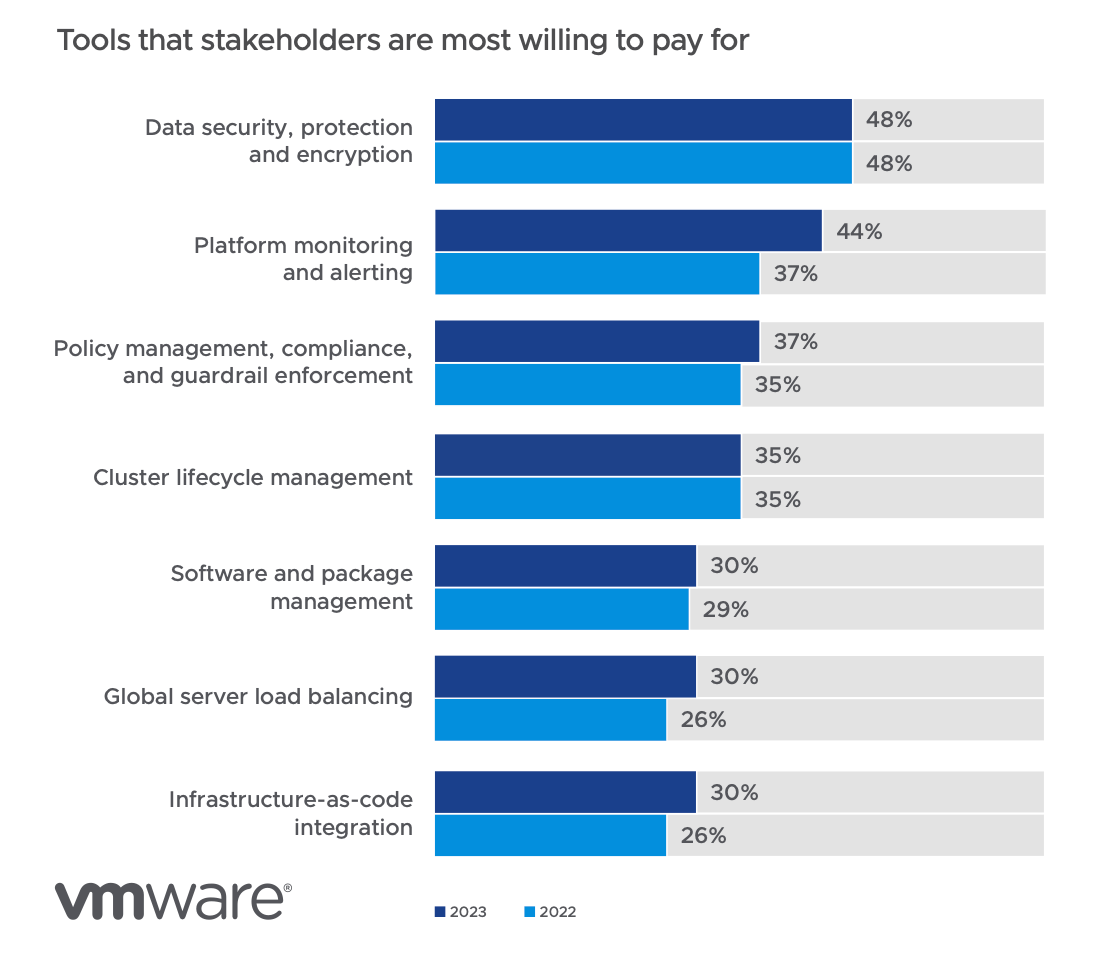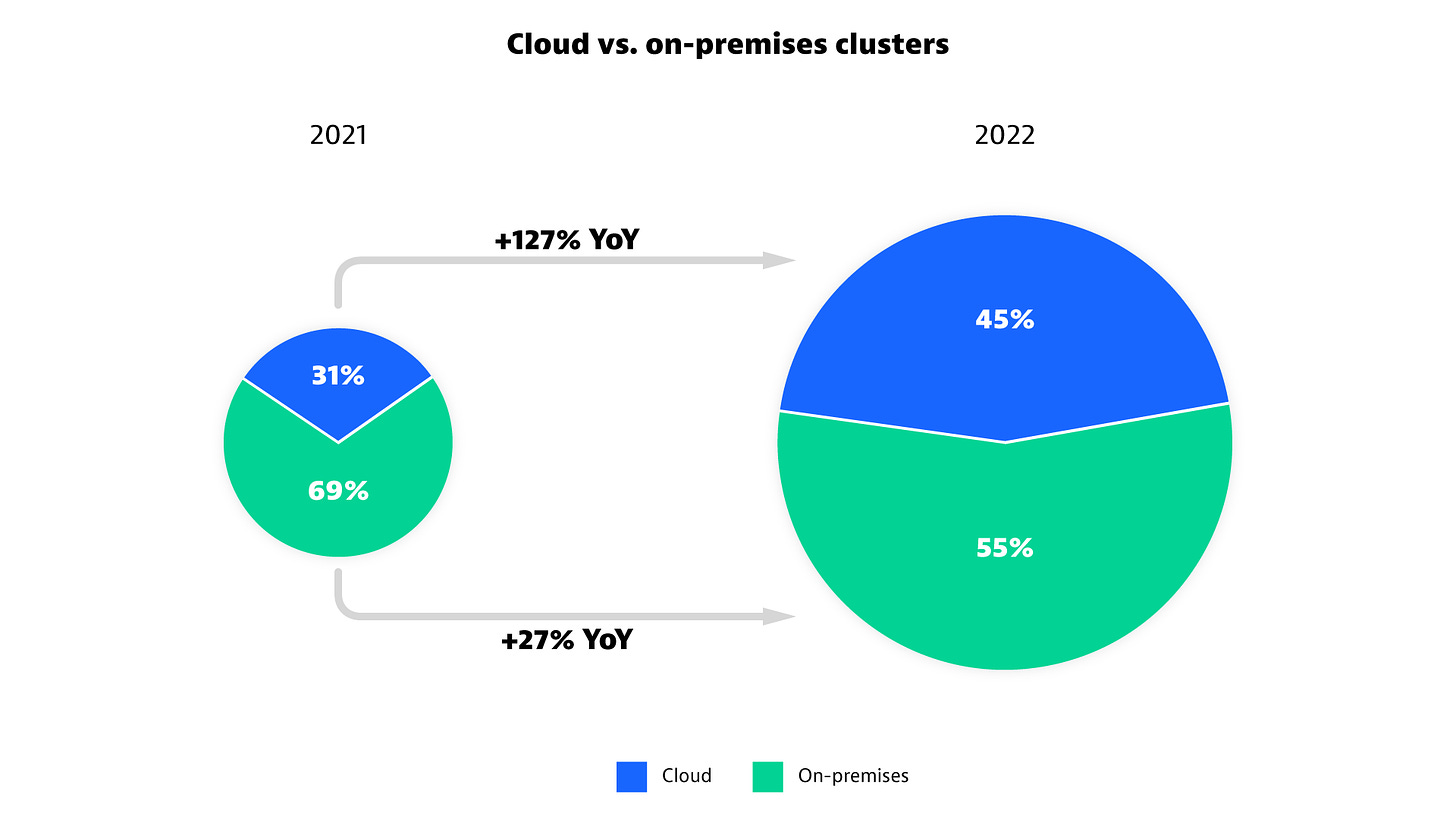Read to the end to see an illustration of the inner workings of cloud infrastructure.
For all the interest in Kubernetes, there's not actually many apps running on it right now. Gartner's Wataru Katsurashima estimates that "by 2027, 25 percent of all enterprise applications will run in containers, an increase from fewer than 10 percent in 2021." When I look at that, it makes me think that, I don't know, there's at best 15% of apps running in kubernetes this year. (Also, the estimate is containers, not specifically Kubernetes.)
The enthusiasm for Kubernetes keeps climbing and over the next few years we’ll see if it’s up to the task of running all those plain old enterprise apps at banks, governments, manufactures, grocery stores, pharmaceutical companies, and so forth. As more organizations use Kubernetes, we’ll see the demand for more tools to help manage and run it. You see that tools use reflected in our recent State of Kubernetes survey.
At the beginning of the 2010’s there was a lot of enthusiasm for using OpenStack as a basis for both public and private clouds, but it moved from a general infrastructure layer to a specialized for telcos and for use in China. Building and running an IaaS layer proved to be difficult. I suspect it was much easier to use public cloud, simple container-based architectures (before Kubernetes), and everyone’s favorite choice of doing nothing new and continuing to use the good ol’ 3 tier’ed apps in VMs.
Kubernetes is at a similar moment in time. For years we’ve heard of how complex it is - it’s the new bag of sharp of knives. Surveys show this year after year. I also get the sense a few times each year that the Kubernetes community is a little bit like the dog that finally caught the bus.
To address that, I suspect we’ll see a lot of interest in paying for tools as the chart from our recent State of Kubernetes Survey shows:
Also, as with OpenStack, I think as the years got by we’ll see less interest in building and managing your own kubernetes. Organizations will instead use the Kubernetes “distros” that are in public clouds, or, that are managed by someone else. Sure, there’ll be plenty of edge cases in…edge, harhahaha…har… Not unlike OpenStack as well.
Here’s a chart from Dynatrace’s user base showing that movement to public cloud:
The big cloud providers that run Kubernetes will get a significant take of the money in the market, as will those who sell tools to manage Kubernetes. Maybe there’ll be an equilibrium between public and private, but I suspect private will always be much smaller.
My other hope is that we’ll return to the idea of a PaaS: a layer that sits on-top of whatever infrastructure (IaaS) you have (here, Kubernetes) and, basically, hides it and automates how application developers use it. Using a PaaS is well understood and has a long track record. The only mystery is why you’d do otherwise.
Relevant to your interests
Qlik acquires Talend to solidify data governance and quality
The secret of selling your product to enterprises - Sales is hard and expensive because of all the time and activities it takes, only the multi-quarter timeline, etc.
Dumping links like Galileo dumped the orange - There’s a lot going on here: ‘These are the interesting discussions we could be having about these tools, if we could stop letting mediocre billionaire live rent-free in our heads as they hold flashlights under their chins and intone “Aaaaaaaay Eyeeeeeeee” in their spookiest voices. These guys are pumping their upcoming dump, and all the biggest disaster-stories are part of the scam: “AI will become sentient” and “AI will do your job as well as you” are both statements whose primary purpose is to increase the value of the stock in companies making “AI” technology (neither “artificial” nor you get the idea). I mean, sure, our bosses will fire our asses and replace us with shell-scripts, but they don’t need working AI to do that – no more than they needed working voice response systems to replace human operators. They just enshittify their products and services, and do it under cover of chasing amazing new technology, and reap the stock gains bequeathed by keyword-drunk investors. But the endless repetition of this vision of Fully Automated Austerity Pronatalist Space Neofeudalism gives people absolute brain-worms.’
Start Your Architecture Modernization with Domain-Driven Discovery - For when you’re doing more than just lift and shift. Also, Marc and I wrote up using DDD for app modernization in our book The Legacy Trap, free to download!
The Cult of the Founders - Operating a large tech company is a different set of skills than marketing a small company.
“The Dead Silence of Goods”: Annie Ernaux and the Superstore - The culture of big box stores as seen through French eyes.
ICYMI: Instagram’s New App Could Be Here By June - Adding a microblog to Instagram?! // “You can post text updates up to 500 characters (that’s less than an Instagram caption, an extended tweet or a LinkedIn post so be concise!)”
Economist Daron Acemoglu: ‘When mistakes involve powerful technologies, you’re going to have trouble’ - ‘He imagines a day when teachers could use AI to create individual lesson plans for every student, or nurses might be able to take on much greater roles in, for example, diagnosing diseases. “Why is it that nurses cannot prescribe medications? Why must everything go through this very hierarchical approach where you have to call a doctor [to do that]?” As it is today, the people who spend the most time with patients — nurses, not doctors — are those who are paid and valued the least. Using technology to empower such workers would raise overall productivity and quality of care while also raising wages.’
Upcoming
Talks I’ll be giving, things I’ll be doing, places I’ll be going.
May 25th Making digital transformation stick in government agencies, online. May 31st Fireside chat with the GM of my business unit at VMware, online. June 1st VMUG Belgium in Brussels, free. June 7th State of Kubernetes overview, online. June 8th to 9th PlatformCon, online. June 21st Cloud Foundry Day, Heidelberg, speaking. June 22nd to 23rd DevOpsDays Amsterdam August 21st to 24th SpringOne & VMware Explore US, in Las Vegas. Sep 6th to 7th DevOpsDays Des Moines, speaking. Sep 18th to 19th SHIFT in Zadar.
Logoff
Here is a fun picture:




